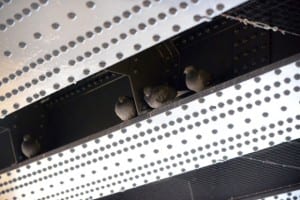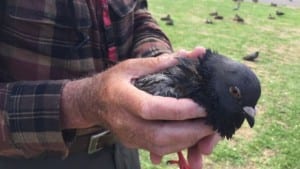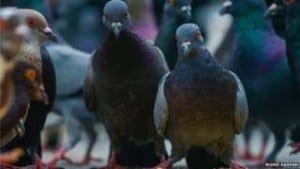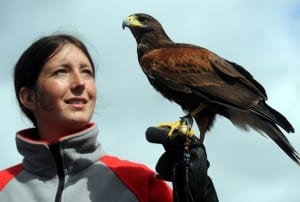
by Pigeon Patrol | Jan 31, 2016 | 4-S Gel Bird repellent, Bird Netting, Pigeon Patrol's Services, UltraSonic Bird Control
 I was sitting in the High Street, outside M & S, waiting for Sue to finish buying up the whole store.
I was sitting in the High Street, outside M & S, waiting for Sue to finish buying up the whole store.
A chap came up and had a carrier bag of tit-bits for the pigeons.
They seemed to know him and flew down for a bit of lunch.
How healthy they looked with most of them still having their legs and toes.
In London practically all the pigeons look tatty, have no feet or are dragging a leg because it was entwined with cotton, wire or some other form of ligature.
Previously I had been sitting, waiting for the train, on Marylebone Station.
A couple of pigeons were gleaning what they could on the concourse.
There it was.
One had a definite limp with cotton wrapped around its leg, a ligature almost severing the foot.
How could I ignore it?
I couldn’t.
I went into M & S and bought some biscuits.
The plan was to entice our pigeon to come within distance then I could pounce and grab.
Did this without any trouble. Then to untangle the cotton from its leg.
Bad mistake.
As I started to unwind it the leg started to bleed profusely.
From being a hero I had become a villain who made pigeons bleed.
I stemmed the bleeding with tissues and getting a box, once more in M & S, I took my bemused pigeon back to Tiggys where, once the cotton had been removed, the leg could be sutured back together.
The true endorsement of the pigeon that I witnessed was in St Mark’s Square in Venice.
The local council had banned the sale of pigeon food. I was in Venice where a group of tourists in wheelchairs were having a fabulous time feeding the pigeons. They were loving every minute of it.
Leave the pigeons be.
Somebody loves them.
About Pigeon Patrol:
Pigeon Patrol Products & Services is the leading manufacturer and distributor of bird deterrent (control) products in Canada. Pigeon Patrol products have solved pest bird problems in industrial, commercial, and residential settings since 2000, by using safe and humane bird deterrents with only bird and animal friendly solutions. At Pigeon Patrol, we manufacture and offer a variety of bird deterrents, ranging from Ultra-flex Bird Spikes with UV protection, Bird Netting, 4-S Gel and the best Ultrasonic and audible sound devices on the market today.
Voted Best Canadian wholesaler for Bird Deterrent products four years in a row.
Contact Info: 1- 877– 4– NO-BIRD (www.pigeonpatrol.ca)

by Pigeon Patrol | Jan 30, 2016 | Bird Netting, Pigeon Patrol's Services, Pigeon Spikes, UltraSonic Bird Control
 Rick Gibson, UA Cooperative Extension
Rick Gibson, UA Cooperative Extension
Birds can devastate young vegetable seedlings or ruin fresh fruit in the blink of an eye but if we know what to do, and take action before they strike, we can often prevent problems.
Many of us are all too familiar with damage caused by birds to ripening apricots, plums, grapes and other garden fruits. We know it happens and even come to expect it. However, few people realize that birds can also seriously damage vegetable gardens. The fact is that yes, birds can make pests of themselves in vegetable gardens, particularly when young plants are in the seedling stage. Some people would be quick to say that they can be very aggravating pests. For those who know what I am talking about, I sense your frustration.
Birds can damage fruit and vegetables in two basic ways. The most obvious is direct feeding and the other is contamination of food products. Let’s consider some examples.
Horned larks are notorious in the commercial vegetable industry and in home vegetable gardens for nipping at new seedlings emerging from the ground. They usually don’t really eat the plant. Mostly they just bite it, perhaps for a taste of the sap. Sometimes though, they will pull it completely out of the ground. In these cases, it is not uncommon to find the poor, abused seedling lying discarded nearby after this not too gentle treatment. Horned larks are not the only ones that do this of course, but they are notorious for this kind of damage.
Other birds like finches, sparrows, thrashers and wrens will peck holes in the soft flesh of ripening fruit. Figs, apricots, peaches and plums are common targets for birds. Woodpeckers and their relatives, the sapsuckers, peck holes in the rinds of citrus fruit looking for a juicy taste of fresh fruit. Many birds figure out how to hunt the seeds that you just put in the ground and have lunch at your expense. If you are growing your own grains, watch out for the red-winged blackbird. They and their cronies will absolutely love your harvest.
Birds also cause damage to garden crops through direct contamination of the edible parts of the plant. Bird droppings are usually not a problem when they fall on fruits that will be peeled, but when they end up on difficult to wash fruit like blackberries, strawberries and clusters of table grapes, they make a real mess and the residues could harbor disease.
The sight of bird feces on fresh fruit is guaranteed to quickly destroy any desire one might have to pluck a ripe fruit and plop it directly in the mouth. Even so, most produce can be cleansed with a careful washing. In fact, it is a good idea to inspect food materials carefully before you place anything in your mouth. Even if you can’t see any contamination, it is always good to wash before you eat. It is better to be safe than sorry, I say.
How do we prevent bird problems in the garden? When thinking about control, many people quickly jump to the idea of chemical poisons and repellents. However, since most gardeners do not have the proper training, certification and license to use chemicals to control birds, that way is out. Don’t even think about it. Put it out of your mind. Don’t go there.
The same goes for shooting with fire arms, sling shots or arrows. There are a whole bunch of laws that if violated, could bring embarrassment, financial difficulties and even imprisonment. Unless you have legal permission, birds cannot be harmed in any way. Just so we are clear, almost every bird you see is protected by state and/or federal regulations. Killing or injuring birds without a license carries a stiff punishment and could get you into big trouble. Don’t do it.
So, what can you do to protect your garden from the ravages of hungry birds? There are a number of things that can be done and most fall within three categories: frightening devices, mechanical barriers and habitat modification.
Okay, let me emphasize right here that I am not recommending the use of loud sounds in populated areas to frighten away birds. While farmers out in the country might get away with propane cannons, fireworks and blank shotgun blasts, no one in the city wants to wake up to a loud bang or pop at the crack of dawn. Not only will the neighbors be upset, but the local law enforcement community also. They take a dim view of such activities, even if it is in the name of good gardening, because there are laws against disturbing the public peace.
On the other hand, a good predator silhouette works very well to frighten birds away. It is quiet and causes no harm to the animals. Some people use hawks or snakes, but I like to use an owl. Strategically placed and moved regularly, birds have a tough time telling the difference between a real owl and a plastic one in the few seconds they have to make a life or death decision. I really like the plastic owl that, with power from a solar collector, is able to move its head. Any movement is good because it gives the birds a more realistic view. I have seen birds literally do a U-turn in mid flight when they suddenly see what they think is a live owl hiding among the foliage of a fig or apricot fig. Predator images seem to work equally well in vegetable gardens.
Mechanical barriers are another good way to keep birds away from sensitive plants. Many people already use bird netting over citrus, apricots, grapes and plums to protect their fruit. Floating row covers, light spun fabric especially designed for agricultural use or the netting you use on your fruit trees can be set up to keep birds away from tender vegetable plants until they are large enough that birds lose interest. The floating row cover can be laid directly on top of the plants because they are light enough that they do not damage plants. Netting can be laid on top of a pole framework to keep them off the plants.
The last way to prevent bird damage is to change the natural habitat around your garden. Modifying conditions to make the area less interesting to the birds will help prevent bird populations from becoming excessive. The fewer the birds, the less damage will be sustained.
Of course, birds can travel some distance to a feeding area so habitat modification may have its limits, but anytime we can camouflage or make a feeding site less interesting, the better off we will be. Common modification techniques include removing roosting areas like trees and shrubs in the vicinity of the garden area, moving the bird bath and decorative bird houses to another part of the yard and eliminating nearby resting areas.
Birds cause many types of damage in the garden. While there are some things that we definitely should not do, there are steps that you and I can take to effectively prevent bird damage without harming protected species.
About Pigeon Patrol:
Pigeon Patrol Products & Services is the leading manufacturer and distributor of bird deterrent (control) products in Canada. Pigeon Patrol products have solved pest bird problems in industrial, commercial, and residential settings since 2000, by using safe and humane bird deterrents with only bird and animal friendly solutions. At Pigeon Patrol, we manufacture and offer a variety of bird deterrents, ranging from Ultra-flex Bird Spikes with UV protection, Bird Netting, 4-S Gel and the best Ultrasonic and audible sound devices on the market today.
Voted Best Canadian wholesaler for Bird Deterrent products four years in a row.
Contact Info: 1- 877– 4– NO-BIRD (www.pigeonpatrol.ca)

by Pigeon Patrol | Jan 27, 2016 | Bird Netting, Pigeon Patrol's Services, Pigeon Spikes
 Some very interesting new research has uncovered something remarkable about pigeons. Apparently, they can learn much like a human.
Some very interesting new research has uncovered something remarkable about pigeons. Apparently, they can learn much like a human.
“The research shows the mechanisms by which children learn words might not be unique to humans,” comments study author Bob McMurray, of the University of Iowa. “Children are confronted with an immense task of learning thousands of words without a lot of background knowledge to go on. For a long time, people thought that such learning is special to humans.”
McMurray goes on to say, “What this research shows is that the mechanisms by which children solve this huge problem may be mechanisms that are shared with many species.”
Obviously, a pigeon does not have the same capacity for information as a human, but the study suggest that they have, at least, comparable capacity for learning.
“It is certainly no simple task to investigate animal cognition; but, as our methods have improved, so too have our understanding and appreciation of animal intelligence,” explains study author Ed Wasserman, of the University of Iowa. “Differences between humans and animals must indeed exist, many are already known. But, they may be outnumbered by similarities. Our research on categorization in pigeons suggests that those similarities may even extend to how children learn words,”
He presents hypotheticals: “Would children learn faster than pigeons? Almost certainly; However, our pigeons came to the experiment with literally no background knowledge. They did not understand the nature of the ‘task’ they had not encountered these categories before, and they had empty lexicons.”
“Children, on the other hand, bring all of these things to bear on the problem of learning words,” he says. “Thus, the more relevant comparison group may be newborn infants, who indeed take 6 to 9 months to learn their first words.”
About Pigeon Patrol:
Pigeon Patrol Products & Services is the leading manufacturer and distributor of bird deterrent (control) products in Canada. Pigeon Patrol products have solved pest bird problems in industrial, commercial, and residential settings since 2000, by using safe and humane bird deterrents with only bird and animal friendly solutions. At Pigeon Patrol, we manufacture and offer a variety of bird deterrents, ranging from Ultra-flex Bird Spikes with UV protection, Bird Netting, 4-S Gel and the best Ultrasonic and audible sound devices on the market today.
Voted Best Canadian wholesaler for Bird Deterrent products four years in a row.
Contact Info: 1- 877– 4– NO-BIRD (www.pigeonpatrol.ca)

by Pigeon Patrol | Jan 20, 2016 | 4-S Gel Bird repellent, Bird Netting, Pigeon Patrol's Services
 A pest control contractor hired by Halifax has been using poison to control the pigeon population at the Keshen Goodman Public Library.
A pest control contractor hired by Halifax has been using poison to control the pigeon population at the Keshen Goodman Public Library.
CBC News uncovered the information when the city’s pest control contract came up for renewal. The new tender for services in Halifax includes a mention of “an Avitrol program” at the library.
Avitrol is described by its manufacturer as a flock deterrent. It’s designed to look like corn kernels and left out for birds to eat.
Once it’s consumed, Avitrol affects the birds’ central nervous system and causes convulsions that can last more than four hours. The prolonged, uncontrolled flapping is meant to scare other birds away.
The company’s website states there is no way to effectively use Avitrol without some birds dying from the product.
Hope Swinimer, founder of Hope for Wildlife, says she’s seen a number of poisoned birds brought to her shelter.
“It looks like they are struggling, just like mini seizures,” she said. “They look really confused and there’s sometimes vomiting too.”
Avitrol is currently banned in New York City, San Francisco, the United Kingdom and Red Deer, Alta.
Visitors to the Keshen Goodman Library were surprised to hear the poison has been used to control birds in the area.
“I think placing poison for that is not a good idea,” said Brenda Gionet.
“Sometimes my kids fall down and they put their hands on ground,” said Herman Bhuller.
Poison may not be effective
“If there’s poison on the ground and if they swallow it, I think that would be dangerous.”
The poison may not even be very effective. Many wildlife experts said new birds often move into the area once the previous birds are killed or scared off.
“If you revisit the spot, six months down the road, you’re going to see the exact same problem,” said Swinimer.
After CBC News contacted the city with questions about Avitrol, officials said the poison would no longer be specifically mentioned in the next tender for pest control, up for renewal this year.
However, there is no ban preventing Halifax’s contractor or other pest control companies from continuing to use Avitrol on public or private property.
About Pigeon Patrol:
Pigeon Patrol Products & Services is the leading manufacturer and distributor of bird deterrent (control) products in Canada. Pigeon Patrol products have solved pest bird problems in industrial, commercial, and residential settings since 2000, by using safe and humane bird deterrents with only bird and animal friendly solutions. At Pigeon Patrol, we manufacture and offer a variety of bird deterrents, ranging from Ultra-flex Bird Spikes with UV protection, Bird Netting, 4-S Gel and the best Ultrasonic and audible sound devices on the market today.
Voted Best Canadian wholesaler for Bird Deterrent products four years in a row.
Contact Info: 1- 877– 4– NO-BIRD (www.pigeonpatrol.ca)

by Pigeon Patrol | Jan 18, 2016 | Bird Deterrent Products, Bird Netting, Pigeon Patrol's Services
 While the peregrines are away, the pigeons will play.
While the peregrines are away, the pigeons will play.
Salt Lake City’s peregrine falcons are not using the nest box atop the Joseph Smith Memorial Building this spring, and pigeons — one of the raptor’s favorite foods — have taken advantage of the vacancy.
People checking in on the peregrine falcons via the web cameras installed at the nest box instead will see the lowly birds.
The 2015 nesting season dissolved when a female falcon that had been at the nest box was found injured and captured March 29. The female, which a state biologist believes has raised 11 youngsters in the box since 2011, was diagnosed with aspergillus, a fungal respiratory disease. She remains in a wildlife rehabilitation center.
Bob Walters, a watchable wildlife coordinator with the Utah Division of Wildlife Resources, says she is recovering, but has some lingering issues.
“If it clears up, we will let her go,” Walters said. “If it doesn’t, it is logical she could end up as an educational bird.”
Walters has spotted another pair of falcons hanging around the One Utah Center, at 201 S. Main St. He set up a nest box on the building April 21, but the birds have not been caught using it.
“Humans are pretty spoiled; we expect success,” Walters said. “Nature doesn’t always happen that way.”
The free-loading pigeons may be soon be evicted and the cameras turned off.
“I’m an optimist. We will wait a little longer,” Walters said.
Most peregrine falcons have already hatched this season, he said. “We are just waiting to make sure no falcons show up, and then we will likely close up the box.”
About Pigeon Patrol:
Pigeon Patrol Products & Services is the leading manufacturer and distributor of bird deterrent (control) products in Canada. Pigeon Patrol products have solved pest bird problems in industrial, commercial, and residential settings since 2000, by using safe and humane bird deterrents with only bird and animal friendly solutions. At Pigeon Patrol, we manufacture and offer a variety of bird deterrents, ranging from Ultra-flex Bird Spikes with UV protection, Bird Netting, 4-S Gel and the best Ultrasonic and audible sound devices on the market today.
Voted Best Canadian wholesaler for Bird Deterrent products four years in a row.
Contact Info: 1- 877– 4– NO-BIRD (www.pigeonpatrol.ca)

by Pigeon Patrol | Jan 16, 2016 | Bird Deterrent Products, Bird Netting, Pigeon Patrol's Services, Pigeon Spikes
 Technology has its part to play at the Wimbledon tennis championships but it isn’t about to replace one important high-flying job.
Technology has its part to play at the Wimbledon tennis championships but it isn’t about to replace one important high-flying job.
Rufus the hawk is to keep his role scaring off pigeons around the SW19 event after his owners rejected suggestions a drone could take his place.
The Harris hawk is a regular visitor to the All England Lawn Tennis Club where he has been keeping feathered pests away for the last seven years.
Rufus’s owner Imogen Davis said drones do not have the “predatory instinct” of a bird of prey.
She said: “Pigeons would simply get used to them and become accustomed to them. Rufus is a predator, drones are not.”
Reaching speeds of up to 30mph, eight-year-old Rufus has been making weekly visits to the south-west London venue over the past 12 months.
He will step up to daily 5am patrols when the highlight of the British tennis calendar begins on Monday.
The Harris hawk, who has his own Twitter page and pass to enter Wimbledon, can also be found scaring off pigeons at Craven Cottage, the home of Fulham football club, as well as Westminster Abbey and Billingsgate Fish Market.
Rufus hit the headlines three years ago when he was stolen from a car overnight during Wimbledon.
After widespread media coverage, the bird of prey was handed in to the RSPCA a few days later.
About Pigeon Patrol:
Pigeon Patrol Products & Services is the leading manufacturer and distributor of bird deterrent (control) products in Canada. Pigeon Patrol products have solved pest bird problems in industrial, commercial, and residential settings since 2000, by using safe and humane bird deterrents with only bird and animal friendly solutions. At Pigeon Patrol, we manufacture and offer a variety of bird deterrents, ranging from Ultra-flex Bird Spikes with UV protection, Bird Netting, 4-S Gel and the best Ultrasonic and audible sound devices on the market today.
Voted Best Canadian wholesaler for Bird Deterrent products four years in a row.
Contact Info: 1- 877– 4– NO-BIRD (www.pigeonpatrol.ca)

 I was sitting in the High Street, outside M & S, waiting for Sue to finish buying up the whole store.
I was sitting in the High Street, outside M & S, waiting for Sue to finish buying up the whole store.

 Rick Gibson, UA Cooperative Extension
Rick Gibson, UA Cooperative Extension
 Some very interesting new research has uncovered something remarkable about pigeons. Apparently, they can learn much like a human.
Some very interesting new research has uncovered something remarkable about pigeons. Apparently, they can learn much like a human.
 A pest control contractor hired by Halifax has been using poison to control the pigeon population at the Keshen Goodman Public Library.
A pest control contractor hired by Halifax has been using poison to control the pigeon population at the Keshen Goodman Public Library.
 While the peregrines are away, the pigeons will play.
While the peregrines are away, the pigeons will play.
 Technology has its part to play at the Wimbledon tennis championships but it isn’t about to replace one important high-flying job.
Technology has its part to play at the Wimbledon tennis championships but it isn’t about to replace one important high-flying job.